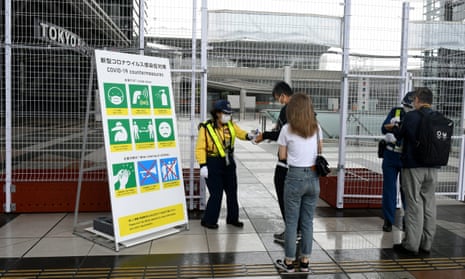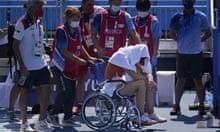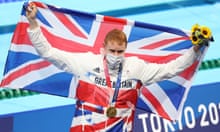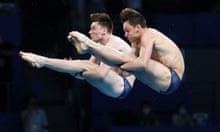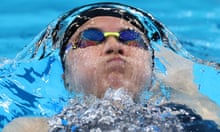Japan could be forced to reverse a decision to allow up to 10,000 local sports fans to attend events at this summer’s Olympics, as a rebound in coronavirus cases has made it less likely that restrictions in place in Tokyo can be lifted, as planned, before the Games begin.
The Tokyo 2020 organising committee and the International Olympic Committee (IOC) announced last month that attendances would be capped at 50% of a venue’s capacity, or up to 10,000 spectators. They had already decided not to allow overseas visitors to attend.
The Japanese prime minister, Yoshihide Suga, said having no spectators remained an option, with the number of Covid-19 infections rising steadily since he ended a full state of emergency in the capital and other regions towards the end of last month.
“I have made clear that having no spectators is a possibility,” Suga said. “We will take steps as we prioritise the safety and security of the people.”
Tokyo reported 673 new Covid-19 cases on Thursday, up from 570 from the same day a week earlier. That was the 12th straight day of week-on-week rises. On Wednesday, infections in Tokyo exceeded 700 for the first time since late May.
Japanese media reported on Friday that the IOC and other parties would meet on 8 July to discuss the spectator cap, with the Yomiuri Shimbun newspaper claiming fans could be banned from Olympic events held at night or in larger venues.
Concern is growing that the arrival of tens of thousands of athletes, journalists, officials and other Games-related staff could trigger a fresh wave of infections after the Olympics open on 23 July, despite reassurances by organisers that they have taken steps to ensure a “safe and secure” event.
Tokyo is under “quasi” emergency measures that include requests for restaurants and bars to stop selling alcohol at 7pm and to close an hour later. But the restrictions, which are due to be lifted on 11 July, have failed to prevent cases from rising.
The Olympic attendance cap is contingent on Tokyo exiting the quasi state of emergency before the Games begin. The government could reinstate full emergency measures for Tokyo depending on how much pressure the rise in cases is placing on the city’s hospitals, Reuters quoted a government source as saying.
On Thursday, Dr Mitsuo Kaku, a medical adviser to the Tokyo metropolitan government, said the situation in the capital was becoming “critical” as the latest upsurge was being driven by the more transmissible Delta variant of the virus.
A study published this week said that under the most optimistic scenario, new cases in Tokyo could reach 1,000 a day in July and 2,000 in August. If there is an acceleration in infections during or after the Games, hospital bed usage in the capital could reach its limit in August, according to university researchers and the National Institute of Infectious Diseases.
